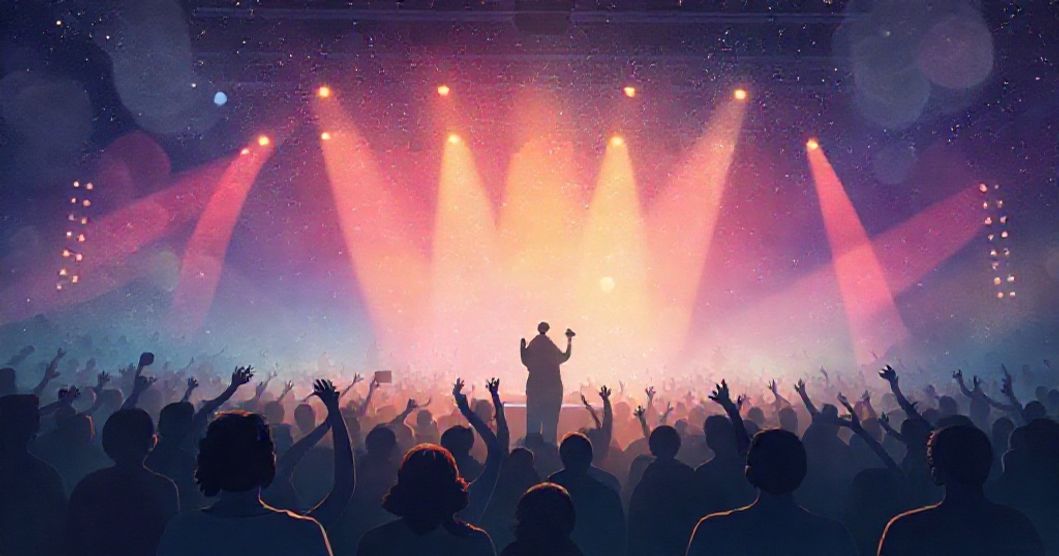Part 1: Dream Presentation
Music has an extraordinary way of bridging the gap between conscious and unconscious experience, often manifesting in our dreams as vivid, emotionally charged encounters. This particular dream offers a window into the dreamer’s inner world, where the anticipation of a first Travis Scott concert merges with the deeper need for connection and gratitude. Consider this: the dream begins in the throbbing heart of a live concert—sensory details of lights, sound, and crowd energy immerse the dreamer in a shared experience of collective emotion. The transition from the chaotic, exhilarating performance to the intimate, quiet green room is significant, representing a shift from external excitement to internal reflection.
As the dream unfolds, the dreamer’s interaction with Travis Scott moves beyond mere fan-celebrity dynamics. The hug, tears, and heartfelt ‘thank you’ suggest a profound emotional transaction—one where the artist becomes a symbol of comfort, inspiration, or healing. The specificity of the setting (green room, post-concert) grounds the dream in reality, while the emotional intensity transcends the ordinary. The dreamer’s vulnerability in expressing gratitude hints at unspoken needs in waking life, amplified by the upcoming concert—a milestone event that likely stirs both excitement and anxiety about new experiences.
Part 2: Clinical Analysis
Want a More Personalized Interpretation?
Get your own AI-powered dream analysis tailored specifically to your dream
🔮Try Dream Analysis FreeSymbolic Landscape: The Concert as a Portal to Self
The concert venue in the dream functions as a threshold space, symbolizing the dreamer’s transition into new emotional territory. The crowd represents collective experience and belonging, while Travis Scott himself embodies the archetype of the ‘healer’ or ‘guide’—a figure who offers comfort through art. In dream symbolism, celebrities often emerge as projections of our deepest aspirations or unmet needs, and their post-concert interaction here suggests a desire for personalized connection rather than mere fandom.
The hug is a powerful physical symbol of emotional safety and validation. Tears during a dream typically signify the release of pent-up emotions, and the specific act of thanking Travis Scott externalizes internal gratitude. This could represent the dreamer’s recognition of how external art has supported them through challenges, even if those challenges remain unnamed in waking life. The green room, a space of intimacy and transition, underscores the dream’s focus on internal processing rather than external performance.
Psychological Perspectives: Unpacking the Layers
From a Jungian perspective, Travis Scott might function as a ‘shadow’ archetype—representing aspects of the dreamer’s self they admire or need to integrate. The concert experience could symbolize the dreamer’s engagement with their own creative potential, while the post-concert interaction reflects a desire for wholeness. For Freud, this dream might be a ‘wish fulfillment’ narrative, addressing the dreamer’s excitement about the upcoming event while processing underlying anxieties about new experiences.
Cognitive dream theory offers another lens: the dream processes anticipatory emotions tied to the first concert, transforming them into a narrative of connection. The brain’s default mode network, active during dreaming, often synthesizes waking experiences into symbolic stories, helping us process emotions we haven’t fully articulated. Here, the dreamer’s unconscious is working through how music serves as a coping mechanism, using Travis Scott as a stand-in for the healing power of art.
Emotional & Life Context: The Music as Lifeline
The dream’s emphasis on ‘thank you’ and ‘he helped me a lot’ suggests a specific emotional context. The dreamer likely experiences Travis Scott’s music as a source of comfort during difficult periods—perhaps loneliness, self-doubt, or personal struggle. The upcoming concert amplifies these feelings, merging excitement with vulnerability. In waking life, the dreamer may be navigating transitions (new environment, social circle, or personal goal), and the dream reflects their need for external validation of their emotional journey.
The first concert as a milestone event introduces themes of identity and self-expression. The dream’s emotional intensity hints that this experience is not just about entertainment but about claiming a space of belonging and self-actualization. The dreamer may be grappling with how to articulate their gratitude for support systems—whether artistic, emotional, or social—and the dream provides a symbolic platform for this expression.
Therapeutic Insights: From Dream to Self-Awareness
This dream invites the dreamer to explore the specific ways music has supported them. Journaling exercises could help identify key songs, lyrics, or performances that resonated, revealing patterns in emotional triggers and coping mechanisms. Reflecting on the hug and tears as a physical manifestation of gratitude encourages the dreamer to practice self-compassion, acknowledging how external support (even symbolic) can nourish their emotional well-being.
For integration, the dreamer might channel this energy into creating a ‘gratitude ritual’—writing a letter to the music that has impacted them, or planning a meaningful moment before the concert to honor its role in their life. This bridges the gap between dream imagery and waking action, transforming the symbolic ‘thank you’ into tangible self-care.
FAQ Section
Q: Why did the dreamer feel compelled to hug and thank Travis Scott so emotionally?
A: The hug and tears represent a desire for connection with someone who symbolizes comfort or inspiration. The ‘thank you’ externalizes unspoken gratitude for how his music has supported the dreamer through challenges, turning internal emotions into a symbolic act of validation.
Q: What does it mean when a dream about a celebrity feels so emotionally intense?
A: Intense emotional dreams about public figures often reflect the dreamer’s unmet needs for connection, validation, or inspiration. The dream amplifies these feelings by placing them in a relatable context (the concert), helping the unconscious process emotions that feel too vulnerable to express directly.
Q: How can I use this dream to understand my relationship with music in waking life?
A: Reflect on how his music has supported you—identify specific songs or lyrics that resonated. This highlights self-care practices tied to music and helps articulate your needs for emotional nourishment, encouraging intentional engagement with art that heals you.
